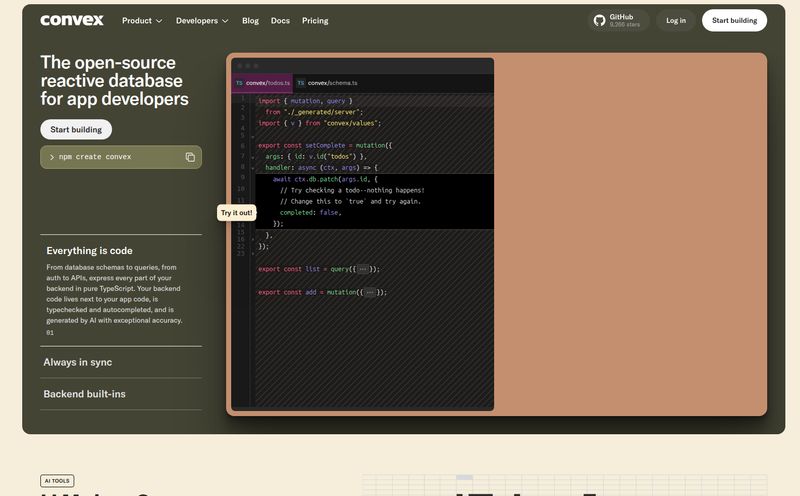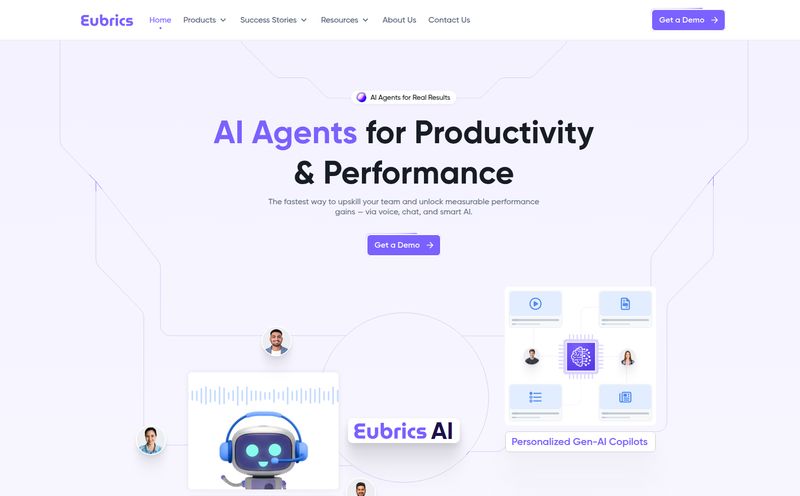It’s 2 AM, the coffee has turned to battery acid in your stomach, and you’re staring at a function you wrote six months ago. It has no comments, the variable names are… creative (shoutout to `dataThingy2`), and you have absolutely no idea what you were thinking. We’ve all been there. It's a developer rite of passage, like arguing about tabs vs. spaces.
Lately, the solution to every single one of these problems seems to be “Just use an AI!” We’re drowning in AI tools. AI for writing, AI for images, and yes, a whole flood of AI coding assistants. I’ve been in the SEO and dev world for years, and my inbox is a graveyard of pitches for the “next GitHub Copilot.” Most of them are just shiny wrappers around the same old thing.
So when I heard about a new tool called Eval, my skepticism-meter went up. Another copilot? Groundbreaking. But then I saw its main claim, and I’ll admit, it got my attention. This one promises to work with any IDE and any programming language. Now that’s interesting.
What Exactly is Eval? And Why Should I Care?
At its core, Eval is an AI coding assistant. Think of it less like a backseat driver who only knows one route and more like a seasoned, multi-lingual navigator who’s happy to ride shotgun in whatever car you’re driving. Whether you’re a die-hard Vim user, a JetBrains fanatic, or you’re still rocking Sublime Text (respect), Eval claims it can plug right in. The same goes for languages. Writing some obscure Lisp dialect for a passion project? Tinkering with Rust? Or just slinging good old JavaScript? Eval says, “No problem.”

Visit Eval
This universal approach is, frankly, a breath of fresh air. I love VS Code, but I don't love feeling locked into an ecosystem. An AI tool should be like a good wrench—it should work on any nut or bolt you throw at it, not just the ones sold by a specific brand. Eval seems to get this. It’s not just about autocompleting your next line of code; it’s about providing a partner for the entire messy, wonderful process of creation.
The Core Features That Caught My Eye
So, it works everywhere. Great. But what does it do? I poked around its feature set, and a few things stood out from the usual marketing fluff.
More Than Just Autocomplete: True AI Pair Programming
This is the big one. Many tools are glorified autocompletes. They’re good, but they don’t help you think. Eval positions itself as a partner for AI pair programming. This means you can supposedly bounce ideas off it, ask for architectural advice, or get help refactoring a particularly nasty bit of code. It’s like having that senior dev on your team who has infinite patience and doesn’t mind you asking “dumb” questions at 3 AM. The potential here for both learning and productivity is massive.
The End of Documentation Drudgery?
I’ll be honest, I’m terrible at writing documentation. I know I should. I know future-me will thank me. But in the moment, I just want to ship the feature. Eval’s promise to help document existing code is a potential game-changer. Imagine pointing it at a legacy codebase you just inherited and getting clear, concise documentation spit out. That’s not just a time-saver; it’s a sanity-saver. That alone could be worth the price of admission… if we knew what it was.
Unit Tests Without the Tears
Right next to documentation on the “chores I’d rather not do” list is writing unit tests. They are absolutely critical for robust software. They are also, often, incredibly tedious to write. The idea of an AI assistant that can analyze a function and generate a solid suite of unit tests is… chef’s kiss. This frees up so much cognitive load to focus on the creative problem-solving parts of the job, not the repetitive, boilerplate-heavy bits.
The Big Promise: Universal Compatibility
I want to circle back to this because I think it’s Eval’s secret weapon. By not tying itself to a specific IDE, it respects a developer's personal workflow. We are a notoriously picky bunch. The tools we use are extensions of our brains, and being forced to switch editors to access a key feature feels wrong. It's main selling point is this freedom.
If Eval can truly deliver a high-quality AI experience in any environment, it could win over a huge segment of the market that feels left behind by the big players. The rebels, the tinkerers, the ones who have their setup customized to perfection and don't want to change a thing.
Let's Be Real: The Potential Downsides
It can't all be sunshine and automated unit tests, right? Every tool has its trade-offs, and from what I can see, Eval has a couple of question marks hanging over it.
The Learning Curve
Any powerful tool requires some learning. How do you prompt it effectively to get the best advice? What are its limitations? Is it easy to integrate, or is it a weekend-long configuration nightmare? The provided info suggests there might be a learning curve, which is fair. But the difference between a gentle slope and a vertical cliff is pretty important.
The Elephant in the Room... Pricing
This is the big one for me. There is zero information on pricing. Is it free? Open-source? A monthly subscription? A one-time fee? This ambiguity makes me nervous. In my experience, companies that aren't upfront about cost are either still figuring it out or preparing to charge a hefty sum. I really hope it's the former. For a tool to be widely adopted by the developer community, a transparent and reasonable pricing model is crucial. A free tier for individuals or small projects would be a fantastic move.
Eval vs. The Titans: A Quick Comparison
How does Eval position itself against the 800-pound gorilla, GitHub Copilot? Based on the available info, here's a rough sketch:
| Feature | Eval | GitHub Copilot |
|---|---|---|
| Core Function | AI Copilot / Pair Programmer | AI Copilot / Advanced Autocomplete |
| IDE Support | Any IDE (claimed) | VS Code, JetBrains, Vim/Neovim |
| Language Support | Any Language (claimed) | Most popular languages |
| Key Differentiator | Universal Compatibility | Deep Integration with GitHub |
| Pricing | Not Specified | Subscription-based (Free for students/OSS) |
The table makes it pretty clear. Eval is betting on freedom and flexibility, while Copilot leans on its deep roots within the world's largest code repository.
My Final Verdict (For Now)
So, is Eval the AI coding assistant we’ve been waiting for? The potential is definitely there. The promise of a truly universal, IDE-agnostic tool that handles the most tedious parts of development—documentation and unit testing—is incredibly compelling.
It feels less like a product from a mega-corp and more like a tool built by developers who've actually felt the pain points we all deal with. However, the lack of transparency on pricing is a major hurdle for me. I’m optimistic, but cautiously so. I’ll be keeping a close eye on this one. If you’re feeling boxed in by your current AI tools, Eval is absolutely worth putting on your radar. It might just be the versatile partner you’ve been looking for.
Frequently Asked Questions about Eval
What is Eval?
Eval is an AI-powered coding assistant designed to act as a pair programmer. It helps developers write code, get programming advice, generate unit tests, and create documentation for their code.
What programming languages does Eval support?
According to its creators, Eval is language-agnostic, meaning it should work with any programming language you use, from mainstream ones like Python and JavaScript to more niche languages.
Does Eval work in my favorite IDE?
This is Eval's biggest selling point. It is designed to be compatible with any Integrated Development Environment (IDE) or code editor, offering a level of flexibility not always seen in other AI coding tools.
How much does Eval cost?
Currently, there is no publicly available information on Eval's pricing. It's unclear if it will be a free service, a subscription model, or have a free tier.
Is Eval better than GitHub Copilot?
"Better" is subjective. Eval's strength appears to be its universal compatibility, while GitHub Copilot benefits from deep integration with the GitHub platform. The best tool for you will depend on your specific workflow and priorities.
Can Eval help with old, undocumented code?
Yes, one of Eval's key features is its ability to analyze existing code and help generate documentation. This could make it an invaluable tool for working with legacy codebases.



